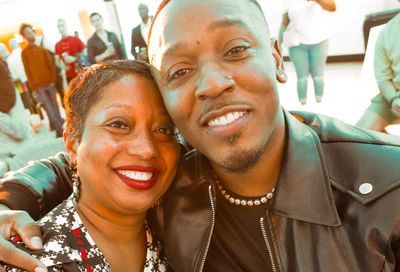Kentucky Supreme Court dismisses Lexington Pride T-shirt case
Owner of Hands On Originals refused to print shirts for Lexington's Pride Festival, citing his religious beliefs

The Kentucky Supreme Court has dismissed a case involving a print shop owner who was accused of violating the city’s Fairness Ordinance after he refused to make a T-shirt for Lexington’s 2012 Pride Festival.
The owner, Blaine Adamson, was approached by festival organizers and asked if he would print up shirts reading “Lexington Pride Festival” with large number “5” consisting of a repeating pattern of rainbow colors inside the number to signify the festival’s fifth anniversary. But Adamson, a Christian who opposes same-sex marriage, refused, arguing that printing the shirts was an implied endorsement of homosexuality and contrary to his sincerely held religious beliefs.
Lexington’s Gay and Lesbian Services Organization (now the Pride Community Services Organization) filed a complaint with the Lexington-Fayette Urban County Human Rights Commission, alleging that Adamson had violated Lexington’s Fairness Ordinance prohibiting discrimination in public accommodations based on sexual orientation. The commission ruled that Adamson had violated the ordinance, ordering him to print the shirts and attend diversity training.
Adamson appealed the commission’s ruling, with the Fayette County Circuit Court finding in his favor. The commission then appealed that decision to the Kentucky Court of Appeals, which ruled similarly, finding that the ordinance does not prohibit private businesses from “engaging in viewpoint or message censorship.”
The commission once again appealed the decision to the Kentucky Supreme Court, but the court dismissed the claim, ruling that GLSO lacked standing to lodge a complaint against Adamson because the Fairness Ordinance was only written to protect individuals from discrimination, reports .
“While the result is no doubt disappointing to many interested in this case and its potential outcome, the fact that the wrong party filed the complaint makes the discrimination analysis almost impossible to conduct, including issues related to freedom of expression and religion,” Justice Laurence VanMeter wrote for the court.
“[I]n this case, because an ‘individual’ did not file the claim, but rather an organization did, we would have to determine whether the organization is a member of the protected class, which we find impossible to ascertain,” VanMeter continued.
“No end user may have been denied the service who is a member of the protected class, or perhaps one was. If so, then the determination would have to follow whether the reason for denial of service constitutes discrimination under the ordinance, and then whether the local government was attempting to compel expression, had infringed on religious liberty, or had failed to carry its burden under [Kentucky’s Religious Freedom Restoration Act]. But without an individual…this analysis cannot be conducted.”
The Pride Community Services Organization expressed disappointment at the ruling, but offered hope to LGBTQ people that the court dismissed the case on a technicality, not on its merits. It noted that the human rights commission is deciding what actions it can take next.
“While we disagree with the ruling, it is important to understand that the court’s decision was a narrow one,” PCSO wrote in a Facebook post. “No ruling was made on the larger civil rights discrimination issues brought forward by the case. … No decision was made on whether discrimination occurred or on the validity of LGBTQ+ non-discrimination ordinances as a whole. Nor was a legal precedent set for businesses to discriminate against the LGBTQ+ community.
“…For us, this case is about much more than a t-shirt, and represents the potential for us to be denied access to basic public services because of our core identities,” the post continued. “It is a valid concern that the ruling for ‘Hands on Originals’ could add fuel to the fire for those who are looking for justification to discriminate against people in the LGBTQ+ community and misunderstand the limited nature of the decision. The ruling illustrates that, whether it be through this case or other efforts, we still have much work to do in ensuring that LGBTQ+ rights are protected in Kentucky.”
Read more:
Virginia Election: Key Races That Could Flip the House and Impact LGBTQ Rights
Philadelphia mayor signs three bills protecting transgender and nonbinary residents
Support Metro Weekly’s Journalism
These are challenging times for news organizations. And yet it’s crucial we stay active and provide vital resources and information to both our local readers and the world. So won’t you please take a moment and consider supporting Metro Weekly with a membership? For as little as $5 a month, you can help ensure Metro Weekly magazine and MetroWeekly.com remain free, viable resources as we provide the best, most diverse, culturally-resonant LGBTQ coverage in both the D.C. region and around the world. Memberships come with exclusive perks and discounts, your own personal digital delivery of each week’s magazine (and an archive), access to our Member's Lounge when it launches this fall, and exclusive members-only items like Metro Weekly Membership Mugs and Tote Bags! Check out all our membership levels here and please join us today!






















You must be logged in to post a comment.